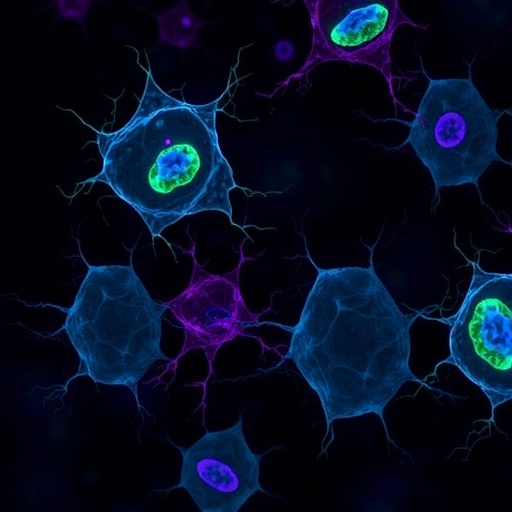In a groundbreaking study published in the prestigious journal Nature on November 5, 2025, researchers at NYU Langone Health have unveiled a promising new avenue to combat lung cancer, specifically lung adenocarcinoma (LUAD), through targeting a cellular survival mechanism known as ferroptosis suppression. This discovery exposes a vulnerability in cancer cells’ defenses and introduces a novel therapeutic strategy that could transform the treatment landscape for one of the world’s deadliest cancers.
Ferroptosis is a specialized form of regulated cell death, distinct from apoptosis and necrosis, that is triggered by the accumulation of iron-dependent reactive oxygen species (ROS). These ROS inflict oxidative damage on crucial cellular components such as lipids, proteins, and DNA, ultimately leading to catastrophic membrane damage and cell demise. While ferroptosis acts as a natural safeguard by enabling the body to eliminate cells under extreme oxidative stress, cancer cells have evolved sophisticated mechanisms to evade ferroptosis, thus sustaining their unchecked proliferation.
Central to this escape from ferroptosis is the ferroptosis suppressor protein 1 (FSP1), which operates as a guardian that detoxifies lipid peroxides, one of the damaging forms of ROS, thereby shielding cancer cells from ferroptotic cell death. The NYU Langone Health team genetically engineered mice to delete the gene encoding FSP1 in lung cancer cells and observed a striking increase in ferroptotic cell death, which corresponded with significantly reduced tumor sizes. This genetic approach essentially unmasked a specific weakness in lung cancer cells, demonstrating that disabling FSP1 profoundly compromises tumor growth.
Encouraged by these findings, researchers tested a novel small-molecule inhibitor of FSP1, termed icFSP1, in mice bearing LUAD tumors. Treatment with icFSP1 markedly suppressed tumor growth and extended survival rates to an extent comparable to the genetic deletion of FSP1, underscoring the therapeutic potential of pharmacologically targeting this protein. Remarkably, this approach did not appear to adversely affect normal cells, suggesting a favorable therapeutic window that could minimize collateral damage and side effects commonly associated with conventional cancer therapies.
The rationale for focusing on FSP1 over other ferroptosis regulators, such as glutathione peroxidase 4 (GPX4), lies in the differential roles these proteins play in cancer versus normal cellular physiology. GPX4 has been studied extensively as a therapeutic target but poses challenges because of its critical functions in normal cells, which raises the risk of systemic toxicity. In contrast, the study demonstrated that FSP1 has a more pronounced role in lung cancer cells’ ferroptosis resistance than in normal tissues, making it an attractive and safer candidate for drug development. Additionally, elevated levels of FSP1 in human LUAD samples correlated with poorer patient prognosis, further highlighting its clinical relevance.
The mechanism by which ferroptosis leads to cancer cell death stems from the iron-catalyzed production of reactive oxygen species that damage polyunsaturated fatty acids within cell membranes. This lipid peroxidation compromises membrane integrity, causing cells to rupture and die. FSP1 acts as a lipid peroxide detoxicant by regenerating reduced coenzyme Q10, a lipid-soluble antioxidant, thereby preventing membrane damage and forestalling ferroptosis. Interrupting this protective activity with icFSP1 effectively lowers the threshold for oxidative stress-induced cell death in tumors.
This research not only sheds light on the fundamental biology of lung cancer survival under oxidative stress but also presents a viable approach for targeted cancer therapy. The therapeutic exploitation of ferroptosis represents a paradigm shift from conventional cytotoxic and targeted therapies that mainly focus on inhibiting signaling pathways or cell division. By harnessing an intrinsic vulnerability of cancer cells— their dependence on suppressing a naturally lethal process—scientists are opening new doors for combating resistant tumor types.
Thales Papagiannakopoulos, PhD, the senior author of the study and an associate professor of pathology at NYU Grossman School of Medicine, emphasized the significance of these findings: “This first test of a drug that blocks ferroptosis suppression highlights the importance of the process to cancer cell survival and paves the way for a new treatment strategy.” His team’s interdisciplinary approach combined molecular biology, pharmacology, and computational analysis to meticulously validate FSP1 inhibition as a promising clinical strategy.
Looking to the future, lead author Katherine Wu, an MD/PhD student working in the Papagiannakopoulos laboratory, revealed plans to optimize FSP1 inhibitors and explore ferroptosis-based therapies for other difficult-to-treat solid tumors like pancreatic cancer. “We aim to translate these findings from the lab into novel clinical therapies,” Wu noted, highlighting the translational potential and broad applicability of ferroptosis-targeting drugs in oncology.
This study exemplifies the collaborative spirit of modern biomedical research, involving scientists from internationally renowned institutions. Contributors hail from NYU Langone Health, Seoul National University, the University of California system, Helmholtz Munich, and other prominent centers. Such extensive cooperation underscores the global importance of finding effective treatments for lung cancer, which remains the leading cause of cancer mortality worldwide.
Funded through an array of prestigious grants from the National Institutes of Health, the American Cancer Society, the European Research Council, and other bodies, this work embodies the impact that sustained investment in science can have on public health. Moreover, the research team managed industry relationships transparently, ensuring scientific integrity while exploring promising new drug leads.
Ultimately, targeting ferroptosis suppression via FSP1 inhibition represents a compelling therapeutic frontier. By tipping the balance back in favor of cancer cell death through intrinsic oxidative stress pathways, this approach could deliver more effective, tailored treatments with fewer side effects. As this emerging research progresses towards clinical trials, it holds the promise of revolutionizing lung cancer therapy and potentially saving countless lives.
Subject of Research: Animals
Article Title: Targeting FSP1 triggers ferroptosis in lung cancer
News Publication Date: 5-Nov-2025
Web References:
DOI: 10.1038/s41586-025-09710-8
Keywords:
Lung cancer, Cell death pathways, Ferroptosis, FSP1, Reactive oxygen species, Lung adenocarcinoma, Targeted therapy, Oxidative stress, Tumor suppression




